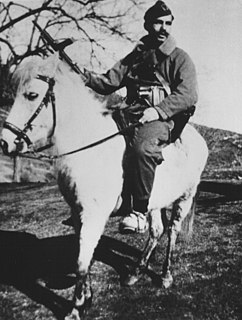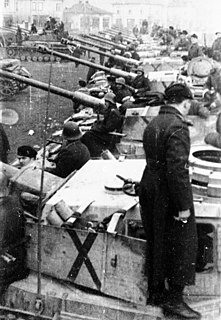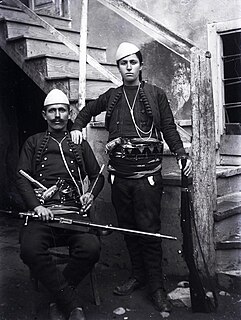Related Research Articles

Flora Brovina is a Kosovar Albanian poet, pediatrician and women’s rights activist. She was born in the town of Skenderaj in the Drenica Valley of Kosovo, and was raised in Prishtina, where she went to school and began studying medicine. After finishing her university studies in Zagreb, where she specialized in pediatrics, she returned to Kosovo and worked for a time as a journalist for the Albanian-language daily newspaper Rilindja. Soon thereafter, she returned to the health care profession and worked for many years in the Pediatrics Ward of the Pristina General Hospital.

The Democratic League of Kosovo is one of the three largest political parties in Kosovo, alongside its longtime rival, the Democratic Party of Kosovo, & Vetevendosje.

The People's Movement of Kosovo was a political party in Kosovo active after the Kosovo War, having originally been founded as a political movement of Albanian nationalists in 1981. Despite participating in several elections in autonomous Kosovo, its pre-war existence was its most historically significant period. Historically, its support and membership came from Albanian diaspora, especially within Switzerland and Germany, originating mainly from former Yugoslav republics.

The Balli Kombëtar, known as Balli, was an Albanian nationalist anti-communist resistance movement and a political organization established in November 1942. It was led by Ali Këlcyra and Midhat Frashëri and was formed by members from the landowning elite, liberal nationalists opposed to communism and other sectors of society in Albania. The motto of the Balli Kombëtar was: "Shqipëria Shqiptarëve, Vdekje Tradhëtarëve". Eventually the Balli Kombëtar joined the Nazi established puppet government and fought as an ally against anti-fascist guerrilla groups.
Adem Demaçi was a Kosovo Albanian politician and writer.
Kosovo during the 20th century history has largely been characterised by wars and major population displacements. The region formed a part of numerous entities, some internationally recognised, others not.

Fadil Hoxha was an Albanian communist revolutionary and politician from Kosovo. He was a member of the Communist party and fought in the Yugoslav Partisans during the World War II. After the war, he was the first Chairman of the Executive Council of the Autonomous Region of Kosovo and Metohija (1945-1963) and later member of the Presidium of Yugoslavia (1974-1984).

The Assembly of Kosovo adopted the flag of the Republic of Kosovo immediately following the unilateral declaration of independence of Kosovo from Serbia of 17 February 2008. The flag design emerged from an international competition, organized by the United Nations-backed Kosovo Unity Team, which attracted almost one thousand entries. The current design was proposed by Muhamer Ibrahimi. It shows six white stars in an arc above a golden map of Kosovo, all on a blue field. The stars symbolize Kosovo's six major ethnic groups.

The German occupation of Albania occurred between 1943 and 1944 during World War II. Before the armistice between Italy and the Allied armed forces on 8 September 1943, Albania had been in a de jure personal union with and was de facto under the control of the Kingdom of Italy. After the armistice and the Italian exit from the Axis, German military forces entered Albania and it came under German occupation, creating the client-state, the Albanian Kingdom.

The Kosovo Operation was a series of military operations leading up to one final push during World War II, launched by the Bulgarian army with the assistance of Yugoslav and Albanian Partisans to expel German forces from Kosovo and prevent the retreat of German forces from Greece. German Army Group E was withdrawing through it from Greece towards Bosnia, since the escape route through Niš and Belgrade had been closed by the Yugoslav Partisan, Bulgarian and Soviet forces.

Azem Bejta, commonly known as Azem Galica, was an Albanian nationalist and rebel who fought for the unification of Kosovo with Albania.

The National Liberation Movement, also translated as National Liberation Front, was an Albanian communist resistance organization that fought in World War II. It was created on 16 September 1942, in a conference held in Pezë, a village near Tirana, and was led by Enver Hoxha. Apart from the figures which had the majority in the General Council it also included known nationalists like Myslim Peza. In May 1944, the Albanian National Liberation Front was transformed into the government of Albania and its leaders became government members, and in August 1945, it was replaced by the Democratic Front.

The Committee for the National Defence of Kosovo was an Albanian organization illegally founded in Shkodër at the beginning of November 1918. It was mainly consisted of the political exiles from Kosovo and was led by Hoxha Kadri from Priština. It existed in looser form since May 1915.
The war crimes trial of Slobodan Milošević, the former President of Yugoslavia, at the International Criminal Tribunal for the former Yugoslavia (ICTY) lasted from February 2002 until his death in March 2006. Milošević faced 66 counts of crimes against humanity, genocide and war crimes committed during the Yugoslav Wars of the 1990s. He pleaded not guilty to all the charges.

Lavdrim Muhaxheri, also known by the nom de guerreAbu Abdullah al Kosova, was a Kosovo Albanian Islamic State (IS) leader and recruiter of ethnic Albanian jihadi foreign fighters fighting in Syria and in Iraq. A former KFOR and NATO employee, he became an extremist and left for Syria in late 2012. He has appeared in several propaganda videos, calling Albanians to join jihad, and has uploaded photographs of himself appearing to decapitate a man, as well as a video where he kills a captive with a rocket. On 24 September 2014, the U.S. Department of State designated Muhaxheri as a global terrorist.

Ramiz Sadiku was an Albanian law student and one of the organizers of the anti-fascist uprising in Kosovo.

Miladin Popović was a Yugoslav Partisan and secretary of the Regional Committee of the Communist Party of Yugoslavia of Kosmet (Kosovo). He was one of the organizers of the partisan fighting in Kosovo. He was posthumously given the Hero of Yugoslavia award.
Sadik Rama was a Kosovo Albanian kaçak guerrilla fighter who fought against the Serbian annexation of Kosovo in 1912. Following the Ottoman defeat, he continued to participate along Isa Boletini and Bajram Curri in the national revolt of 1913–14 in Llapushe. He joined the kaçak guerrillas in 1919 with support from the Committee for the National Defence of Kosovo. He fought alongside Azem Bejta during his lifetime. At the start of World War II, he moved to Albania. His son, Uke Sadiku, continued the fight against the Yugoslav Partisans in Llapushe with Ymer Berisha, Marije Shllaku, and Qasim Bajraktari.
Kosovo is the birthplace of the Albanian nationalist movement which emerged as a response to the Eastern Crisis of 1878. In the immediate aftermath of the Russo-Ottoman war, the Congress of Berlin proposed partitioning Ottoman Albanian inhabited lands in the Balkans among neighbouring countries. The League of Prizren was formed by Albanians to resist those impositions. For Albanians those events have made Kosovo an important place regarding the emergence of Albanian nationalism. During the remainder of the late Ottoman period various disagreements between Albanian nationalists and the Ottoman Empire over socio-cultural rights culminated in two revolts within Kosovo and adjacent areas. The Balkan Wars (1912–13) ending with Ottoman defeat, Serbian and later Yugoslav sovereignty over the area generated an Albanian nationalism that has become distinct to Kosovo stressing Albanian language, culture and identity within the context of secession from Serbia. Pan-Albanian sentiments are also present and historically have been achieved only once when part of Kosovo was united by Italian Axis forces to their protectorate of Albania during the Second World War.
Qerim Sadiku was a Catholic Albanian blessed. He was executed by a firing squad in Shkodër along with clerics Danjel Dajani, Giovanni Fausti, Gjon Shllaku, Mark Çuni and Gjelosh Lulashi. He was accepted as a martyr by the Catholic Church in 2016, part of the Martyrs of Albania.
References
- ↑ Schwartz, Stephen (2009). Communism and Islam in Albania and Kosova, 1941-1999 - from the Partisan movement of the Second World War to the Kosova Liberation War.
Qazim Zogu